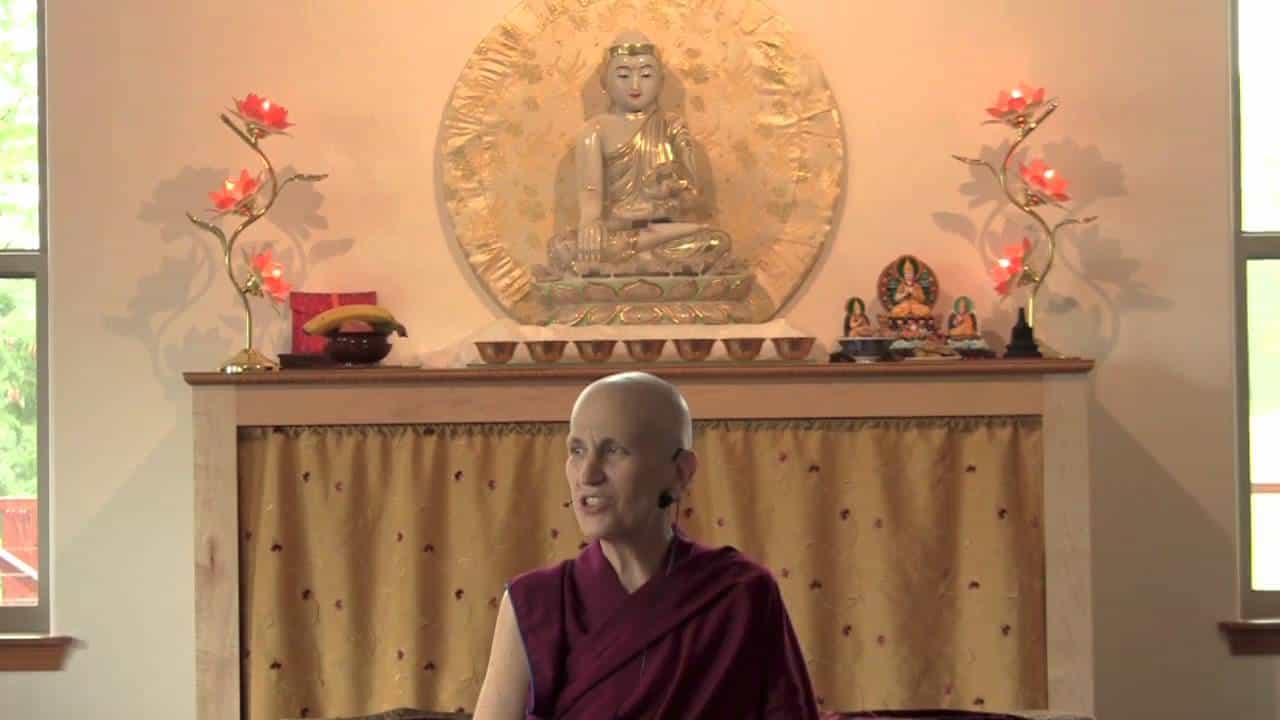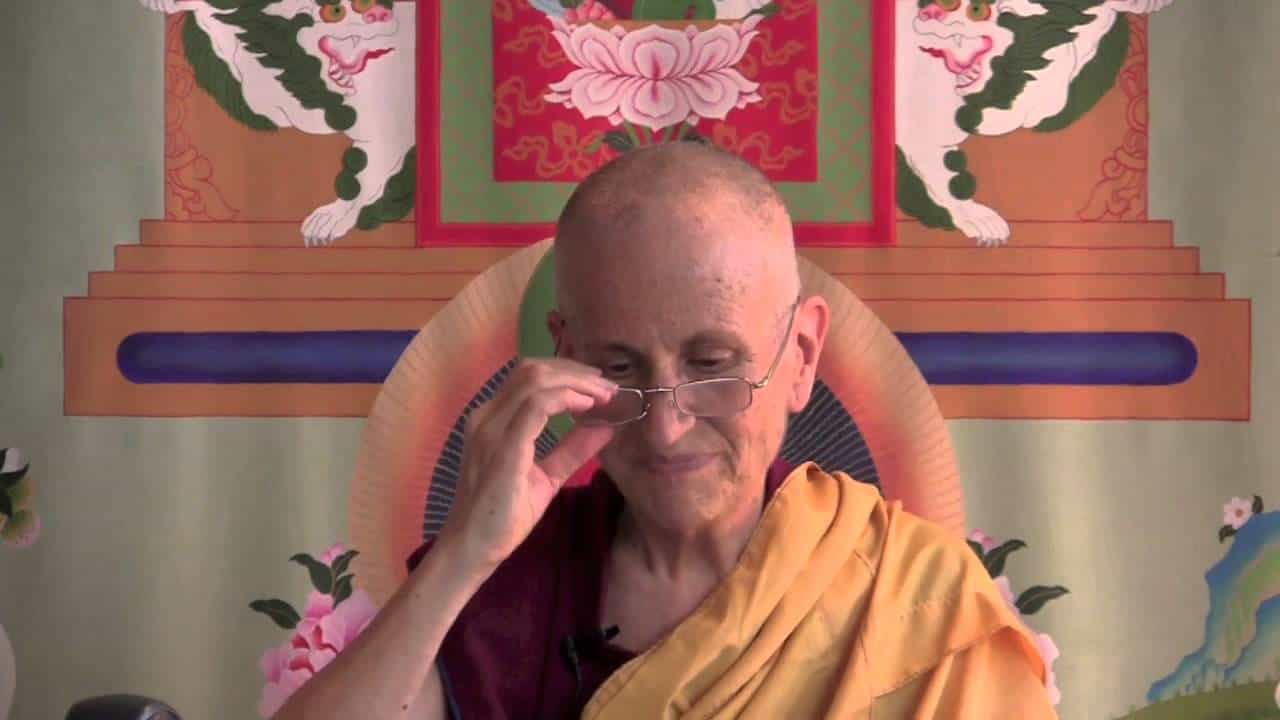Verse 85: Precious and rare medicine
Verse 85: Precious and rare medicine
Part of a series of talks on Gems of Wisdom, a poem by the Seventh Dalai Lama.
- The benefit of words that challenge our afflictions
- The difference in Dharma practice
- Receiving feedback (criticism) as a way of helping ourselves grow
Gems of Wisdom: Verse 85 (download)
What is the precious and rare medicine that kills the appetite but revives the spirit?
True and beneficial words spoken by others in challenge of one’s faults.
Those true and beneficial words that point out our faults are a kind and rare medicine that quenches the appetite. The appetite is for “I want what I want when I want it,” and, “I don’t want what I don’t want when I don’t want it.” So whatever challenges the ideas the lie behind our attachment, our anger, our jealousy, our pride. And so words that are beneficial, words that are true, that challenge our afflictions.
Now here there’s a difference between worldly people and Dharma practitioners. Worldly people, when other people point out their faults, go, “I don’t have that fault. It’s you! You’re projecting on me. You’re critical of me. You’re doing this, you’re doing that….” That’s how we usually respond, right? That’s how worldly people respond. You get defensive. You justify everything. You give a long explanation about why you did what you did because that other person has to understand in detail everything you were thinking. You get defensive, you give a long explanation. Then you get angry. And then you get depressed. Yes? Is that kind of the way it usually works?
The way a Dharma practitioner reacts to this is they are open and they are appreciative and they listen to what the other person’s saying with an open mind, with an appreciative mind, knowing that this information is going to help them to grow and to help them stop their afflictions and their bad habits. So these people, real practitioners, are quite appreciative of this. “Oh, you’re pointing out something in me that I can’t see in myself, thank you.” Because, as the Kadampa geshes say, people who point out our faults are very kind because they show us what we need to work on. Because we can’t work on it if we can’t see it. And as long as it’s “somebody else’s fault” we can’t see it in ourselves and we don’t know what to work on. And so we never grow. We never improve.
This is the whole idea about “rocks in a tumbler polishing each other” is that we’re able to see things in each other that we can’t see in ourselves and we point those things out to other people. But we remain open and appreciative when other people point those things out to us. So the emphasis here is on receiving the feedback.
Some of us say, “Oh! She said we’re supposed to give feedback to everybody.” They only hear the first part of the sentence. So they give feedback to everybody in the community: “You do this and you do this and you do that….” That is not the point. The point is you have to hear the second part of the sentence which is to really regard what the other person is telling us as something said with the idea to help us and to benefit us so that we can do something about our faults.
Now, if we feel like we don’t have any faults then everything everybody says sounds like a false accusation to us. In which case, you must be very close to buddhahood, if you don’t have any faults, and people are falsely speaking according to you. Of course, you might think you’re very close to buddhahood. If you think you’re very close to buddhahood it’s a sign that you don’t know very much. [laughter] It’s like, if people go around proclaiming their realizations and their level of attainments it’s a very good sign that they’re fakes.
We have to be careful of our pride here. Because we can get very proud. “I do not have that fault. They’re projecting their stuff on me.” Then we’re digging ourselves in the same hole, aren’t we? And we can’t change our mind, and where are we ever going to go in this universe where people are not going to point out our faults? I challenge you. Find a place where you’re going to go where people will not point out your faults.
“Oh, the pure land. Amitabha won’t point out my faults.”
You want to make a bet? [laughter]
I mean, the pure land is where you go so that you can really practice the Dharma intensely. So to practice the Dharma intensely your spiritual mentor’s going to point out your faults. So beware, Amitabha’s going to give it to you. [laughter] And of course also provide the antidotes which we have to remember and practice.
But really, where are we going to in samsara where this is not going to happen? There is no place. No place. So we’d better get used to it. And we’d better learn how to deal with it in a way that we make good use of the feedback that people are giving us.
And then it quenches our appetite for egotism and pride and jealousy and attachment and anger, and it revives our spirit because then it really brings us back to our practice. Because whatever happens, we have to apply our practice to it.
Venerable Thubten Chodron
Venerable Chodron emphasizes the practical application of Buddha’s teachings in our daily lives and is especially skilled at explaining them in ways easily understood and practiced by Westerners. She is well known for her warm, humorous, and lucid teachings. She was ordained as a Buddhist nun in 1977 by Kyabje Ling Rinpoche in Dharamsala, India, and in 1986 she received bhikshuni (full) ordination in Taiwan. Read her full bio.


